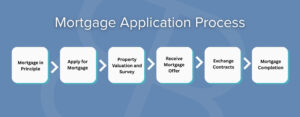How Long Does a Mortgage Application Take?

If you’re applying for a mortgage, you’re probably wondering: “how long will it take for my mortgage application to be approved?”.
While buying a home can feel like a much longer and drawn-out process, thankfully the mortgage application process itself is usually quite a straightforward. The average mortgage application will usually take between 4 to 6 weeks to complete on average.
In this short article, we take you through each stage of the mortgage application process, explaining exactly what can affect the timeline of your mortgage application, and the best tips to help speed up the purchase of your dream property.
Short on time? Watch our quick overview of the mortgage application process.
- Why Does It Take So Long to Get a Mortgage?
- Mortgage Application Timeline
- 1. Mortgage in Principle
- 2. Apply For Mortgage
- 3. Property Valuation and Survey
- 4. Receive Mortgage Offer
- 5. Exchange Contracts
- 6. Mortgage Completion
- Should I Use Life Insurance for a Mortgage?
- How a Broker Can Speed Up The Process
Why Does It Take So Long to Get a Mortgage?
While on the surface a mortgage application might appear to be a series of filling out forms, it actually involves a list of strict checks and paperwork that naturally takes time to process and check.
Lenders will require proof of income, and will typically ask for a minimum of three months’ worth of payslips, bank statements, as well as any other additional financial documents in order to assess your income.
They will also want to have a complete picture of your affordability, including your monthly outgoings, proof of deposit, alongside confirming your identity.
Additionally, you’ll need to instruct a solicitor to handle the legal work, which can often affect the timeline of your mortgage application.
Fortunately, there are some key tips and tricks that you can follow to help speed up your mortgage application. Let’s dive into a step-by-step mortgage application timeline and explore the best tips to help speed up your mortgage application process.
Mortgage Application Timeline
The mortgage application process timeline will vary depending on your personal financial circumstances, your chosen lender’s requirements, and how quickly you provide the necessary documents.
To help you understand what to expect, we’ve created a quick infographic that outlines the six key stages. After, we walk you through each step individually, exploring the entire mortgage process timeline in more detail.

1. Mortgage in Principle
The first step in the mortgage application process timeline is often getting a Mortgage in Principle – otherwise known as an Agreement in Principle (AIP).
An AIP is a written statement from a lender that shows how much they are likely to lend you – based on some initial checks – and can help applicants refine their property search.
Having an AIP will provide you with a greater insight into what property value you can realistically achieve to purchase. As such, it can be used to show both estate agents and sellers that you’re serious about buying with support from your chosen lender.
But how long will it take to get an Agreement in Principle?
The good news – an AIP is usually a very quick process with most lenders being able to provide one within a few hours after you’ve sent the appropriate details and the lender has completed some basic checks. To apply, you’ll typically need to provide:
- Proof of ID (such as a passport)
- Proof of income (like payslips)
- Up to six months of bank statements
Having these documents ready to hand will can help speed things along. Working with a trusted mortgage broker – like Boon Brokers – can help you ensure that you’re matched with the right lender from the start and can streamline your entire mortgage application, including your AIP.
It’s important to note that any figures provided in an Agreement in Principle are not guaranteed. Cruicialy, an AIP is predicated upon basic checks. Should subsequent affordability checks, carried out by your chosen lender, show a poor credit history or a lower than expected income, the final mortgage offer may be for a lower amount or declined altogether.
Discuss the Mortgage Process with our Advisers.
Book a Free Call2. Apply for Mortgage
After you have found a property and have an offer accepted, it’s now time to officially apply for a mortgage.
The mortgage application is a straightforward process but it is vital that you submit all the correct supporting documents when applying for a mortgage.
Working with an established and trusted mortgage broker can help guide you through this process, helping with every aspect of your application – from the paperwork to working with your chosen lender.
When applying for your mortgage, this is the list of essential documentation that you will need to provide:
- Details of the property
While your chosen lender will complete their own valuation of the property you want to purchase, it is important to include details of the property yourself, including the seller’s estate agent and confirmation of your offer.
- Proof of deposit
Every lender will ask for you to proof of your deposit amount to ensure your overall affordability.
- Proof of Identity
You will need to provide some form of proof of identity, this could be a valid photo ID, passport, or proof of current address (usually a recent utility bill, dated within the last three months).
- Proof of Pay
Most lenders will ask for up to six months of payslips showing your regular income, bonuses, and any consistent extras like overtime or commission. If you’re self-employed, you will typically need to provide your last two years of Tax Calculations and Tax Year Overviews from the HMRC.
- Credit check
While you will not have to provide a credit check report yourself, it is worth noting – and preparing – that as part of the process, the lender will carry out a full credit check. Typically, the lender’s credit checks will be a full and more detailed assessment of your creditworthiness. As such, any missed payments or other adverse credit could affect the outcome of your application.
Getting everything in order at this early stage in your application can help prevent delays in the future.
See What Our Clients Have To Say
3. Property Survey and Valuation
As we previously touched upon, before a lender can fully approve your mortgage, they will need to complete their own mortgage valuation survey. This is typically arranged by the lender and is essentially a valuation that will confirm the property that you’re buying is worth the amount you’re asking to borrow.
Simply, the purpose of the mortgage valuation survey is to protect the lender. Should the property be overvalued, then the lender could lose money if you default on the loan. For example, in the scenario that you’re borrowing £200,000 but the property is only worth £180,000, there would be negative equity of £20,000. As such, the lender could struggle to recover the full amount should the property need to be repossessed and sold.
Importantly, the final amount your lender is willing to let you borrow could be adjusted based on the results of your proposed property’s valuation.
Depending on your chosen lender and mortgage, it could be the case that you will need to pay mortgage valuation fees. While in some cases the cost is included in the mortgage deal, it is more common for this fee to be paid separately by the buyer.
Once the valuation is complete and the lender is satisfied with all your documents and affordability checks, they’ll move ahead with approving your mortgage.
How Long Does a Valuation Take?
Generally, the mortgage valuation can be arranged and completed within two days to a week. This will depend on the surveyor’s availability and how quickly access to the property can be arranged.
Once the lender has completed their own valuation report and is satisfied with all additional supporting documentation, they can issue your formal mortgage offer.
It’s worth noting that a property survey – which is a more detailed report and typically for the buyer’s benefit – will take longer and is usually arranged after the mortgage application has been approved.

4. Receive Mortgage Offer
Following the completion of your mortgage valuation survey, the next step is receiving your official mortgage offer letter.
The timescale on receiving your mortgage offer will depend on:
- How quickly the surveyor submits their report to the lender.
- Whether the property valuation matches your requested borrowing amount
Once the valuation has been reviewed and all supporting documents are approved, the mortgage offer is received, typically within 2 to 20 days after the valuation.
The mortgage offer letter is a formal confirmation from the lender that they’re willing to provide the agreed loan amount.
Your mortgage offer will outline the terms of the mortgage, including interest rates, repayment structure, and any special conditions. It is crucial that you review the offer before moving on to accept the conditions that have been proposed.
Once your mortgage offer is received, and you are happy with the offer, the legal side of the process can begin. Your solicitor will review the draft contract, raise any necessary enquiries, and communicate with the seller’s solicitor to resolve outstanding issues before moving towards exchange and completion.
How Long Does a Mortgage Offer Last?
A mortgage offer will generally last for 6 months. However, this time period can vary from one lender to the next.
If there are any delays between receiving the mortgage offer and completing the property purchase, this could lead to the mortgage offer expiring. This is why it’s crucial that your solicitor is as efficient as possible.
5. Exchange Contracts
After your mortgage offer is received, the next official step is the exchange of contracts. However, before this can happen, several conveyancing searches must be completed.
These conveyancing searches are an essential part of the legal process and can help uncover any potential or ‘hidden’ issues that could affect the property’s value or future saleability.
The standard conveyancing searches include:
- Local authority searches
- Land registry searches
- Environmental searches
- Water authority searches
- Chancel repair searches
- Location-specific searches (such as mining or flooding history)
If any problems are discovered in the searches, this can impact whether the property sale goes through or not.
The searches could reveal issues that identify the property may be difficult to sell at a later date. For example, if the area is at high risk of flooding or if the property is built in an area that was formerly used for mining.
It is at this point of the entire mortgage application that can experience the most delays. However, a proactive and experienced solicitor will liaise with trusted third-party providers and chase results regularly to speed things along.
Once all the searches are complete and your solicitor is satisfied, you will agree on a completion date with the seller and formally exchange contracts – at which point the purchase becomes legally binding.

6. Mortgage Completion
After the contracts have been exchanged and the mortgage offer accepted, the final step is the mortgage completion – the moment you officially become the property owner.
At this final stage, your solicitor will need to confirm that all financial arrangements are in place. This includes receiving your deposit into their client account, ready to transfer to the seller’s solicitor on completion day. Additionally, your chosen mortgage lender will also release the loan funds, ensuring the full amount is ready to go.
The overall mortgage offer process, from receiving your offer to reaching completion, typically takes up to two months.
Once the funds are transferred and the sale is finalised, you’ll receive the keys to your new home.
With this being said, there are a series of tasks your solicitor will need to complete after your mortgage completion, including:
- Paying Stamp Duty Land Tax (SDLT)
- Registering the property with the Land Registry
- Sending the title deeds to your mortgage lender
- Issuing their final invoice for legal services
After these tasks are finalised, your mortgage process is complete.
Should I Use Life Insurance for a Mortgage?
It is important to note that life insurance isn’t a legal requirement when applying for a mortgage, however, many lenders and brokers strongly recommend it – and for good reason.
Mortgage life insurance is designed to pay off your mortgage balance in the unfortunate case that you should pass away during the term of the loan, helping protect your loved ones from financial difficulty.
So, how does mortgage life insurance work?
Life insurance is usually set up as a decreasing term policy, where the payout amount reduces over time in line with your mortgage balance. This ensures that, if the worst were to happen, your family could pay off the mortgage and remain in the home without the burden of monthly repayments.
The cost of cover will vary and is dependent on a variety of factors, including your age, health, the amount you want to insure, and the length of the policy.
If you’re unsure which type of life cover is best for you, then working with a trusted mortgage and insurance broker can help you compare policies and find the one that best suits your needs.

Frequently Asked Questions
How Long Does the Mortgage Application Process Take?
As we’ve noted in the body of this article, the exact length of a mortgage application process varies depending on a number of factors, such as your financial situation, the mortgage provider, and the property chain.
However, the average mortgage application process timeline can take anywhere from 4-6 weeks. Working with a trusted mortgage broker can help streamline the application process by ensuring all necessary documents are in order.
What Is a Decision in Principle, and How Does It Impact the Mortgage Application?
A Decision in Principle (DIP) – most commonly known as an Agreement in Principle – is a preliminary confirmation from a lender that demonstrates how much you will likely be eligible to borrow for a mortgage.
Importantly, an Agreement in Principle is not a mortgage offer, rather, it is intended to help give you an idea of how much you are likely to be able to borrow and can be used to demonstrate to sellers that you are a serious buyer.
How Does the Mortgage Valuation Process Affect the Application Timeline?
A mortgage valuation will confirm the property’s value. Depending on the results, this can impact the entire mortgage approval process and timeline.
As such, the mortgage valuation is a crucial step in the mortgage application process. It typically takes a few hours to a few days, depending on the lender and property type.
Why Do Some Mortgage Applications Take Longer Than Others?
Not all mortgage applications are the same. Mortgage applications can take longer if there are issues found with the property valuation, property chain, credit score, or multiple buyers.
In addition, different lenders will have their own unique criteria and requirements that each application will need to meet before the mortgage application can be accepted. For first-time buyer mortgages, you may also require more documentation, extending the timeline.
Can a Mortgage Application Be Approved in Less Than a Week?
While it is possible for some mortgage applications to be approved in under a week, this is typically very rare, and only occurs when the borrower has a strong financial situation, a pre-existing relationship with the same lender, and a straightforward property transaction.
How a Broker Can Speed Up the Process
Working with a trusted mortgage broker can significantly speed up the entire mortgage application process, helping you avoid delays and unnecessary stress.
Here are the key ways a trusted whole-of-market broker, like Boon Brokers, can help you:
- Access to the Entire Market: As a whole-of-market broker can search the entire mortgage market. This means we can match you with a lender who offers both competitive rates and who are likely to approve your application based on your financial circumstances.
- Expert Document Handling: Our dedicated brokers are well-versed in the documentation lenders require. We can help you submit key paperwork, minimising the risk of delays caused by missing or incorrect information.
- Established Lender Knowledge: In a massive mortgage market, every lender has a unique criteria. Here at Boon Brokers, we know what each lender is looking for and can tell you in advance exactly what you’ll need to prepare.
- Smoother Communication With Solicitors: Our dedicated brokers help directly with your solicitor to chase outstanding paperwork, conveyancing searches, or other legal steps.
If you’re starting your mortgage application process or considering a remortgage, Boon Brokers is here to help.
As fee-free mortgage brokers, we provide impartial advice and dedicated support from start to finish.
Contact Boon Brokers today and talk to a dedicated mortgage broker about your requirements now.

Gerard BoonB.A. (Hons), CeMAP, CeRER
Gerard is a co-founder and partner of Boon Brokers. Having studied many areas of financial services at the University of Leeds, and following completion of his CeMAP and CeRER qualifications, Gerard has acquired a vast knowledge of the mortgage, insurance and equity release industry.Related Articles
- What Proof Of Income Is Needed For A Mortgage?
- The House Buying Process
- What Documents Are Needed For A Mortgage?
- Reasons Why Mortgage Applications Are Declined
- What Is A Mortgage In Principle?
- What Should I Ask When Buying A House?
- What Is A Key Facts Illustration?
- How Much Deposit Do I Need For A Mortgage
- Advantages Of A Mortgage Broker
- How To Improve Your Chances Of Getting A Mortgage
- Everything You Need To Know About Buy To Let
- How Does Being Self Employed Affect A Joint Mortgage?





